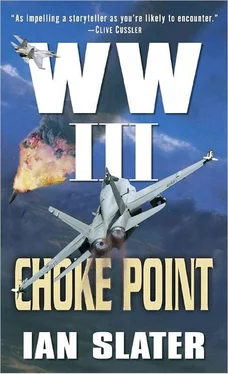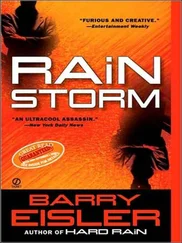But there were only four packs left, Freeman having grabbed two of the baseball-size lumps and quickly stuffed them into his battle vest. With a sharp tug on the bow-knotted davit lines holding the Zodiac to Petrel ’s side, the general rapidly played out the line, lowering the Zodiac.
A sleep-dazed Aussie appeared on deck, holding his MP5. “What’s going—”
“Get in the boat!” Freeman said. “We’re going fishing!”
“Be careful!” Frank cautioned Freeman. “It might be surrendering.”
“It’s turning!” Petrel ’s bow lookout shouted, and everyone, including the approaching Skate a mile off, which Sandra had alerted, heard the noise. It was a tortuous creaking sound of metal against metal, the kind Aussie and Freeman had heard when they faced the Russian-made T-72 main battle tanks in the Iraqi desert. It made the four slingshot crewmen even more nervous.
Through his binoculars, the bosun, who’d momentarily given Freeman a hand by passing down the general’s gun, could now see the source of the nerve-grating sound: the submarine’s prop rubbing against its tapered metallic sheath, which had collapsed under the pressure wave of the seventy-pound LOSHOK depth charge.
“Where the hell’s the Skate ?” someone shouted, another startled by the sputtering then quickly ensuing purr of their Zodiac’s runabout.
“ Skate ’s coming!” the bosun assured the crew.
She was, but on her radar the two blips were so close together, the captain couldn’t tell which was which, and it was too risky to open fire in the fog and noisy confusion. The Skate ’s heavy machine-gun operators, however, were itching to fire, so much so that the captain repeated his earlier order, “Hold your fire!” Following the sub’s carnage in the strait, everyone wanted so badly to get even that blue on blue remained a constant danger.
One of Petrel ’s side-scan technicians ran to the dry lab’s door. No one was there. “Son of—” He realized they must all be up at the bow. Though hanging on to the lab’s roll bar at the time, he’d forgotten the violent U-turn, glued as he was to the trace. He snatched the PA mike from the wall. “Captain, dry lab. A bubbling sound from the sub, as well as the prop noise. Could be flooding her tubes.”
“Maybe,” answered Frank. But what should he do? he wondered. It would be impossible to see a torpedo running at them in the fog. Anyway, the sub was only a hundred yards off, now nose-to-nose with his boat. Even if the Petrel moved left or right, the sub could get an angled shot, or if she opened up with small arms fire, the Petrel would be virtually defenseless.
“Get the packs ready,” he told Jimmy, Malcolm, and Tiny, while taking up one of the slingshots himself. Then he shouted up to the bridge to Sandra, “Go full ahead, close as you can for us — then veer away!”
She signaled with a thumbs-up.
Frank asked, “Where’s the Bic?”
Tiny handed him the cigarette lighter. “High tech!”
The small orange light that the Skate ’s captain, now half a mile away, saw through his binoculars, was not the flicker of Tiny’s Bic, however, but the flame from the.50 protruding from the sub’s sail like a short, stubby stick in the fog. Its burst ricocheted off Petrel ’s forward deck bulkhead like supersonic stones thrown against a steel door. One of the.50’s rounds struck Malcolm in the back of his neck, felling him in a pool of blood that neither Jimmy, Frank, or Tiny saw, the three busy tossing their LOSHOK packs, the force of their thrusts reduced by the nerve-shattering fire of the heavy machine gun, as the trio hit Petrel ’s deck. They crawled forward, tight up against the protection of the capstan as several rounds from the sub struck the spool of anchor chain, creating a shower of sparks as Petrel heeled hard aport at full speed. The wash of Petrel’s prop was now clearly visible to the sub’s machine-gun crew, who kept pouring their fire into the big target as it withdrew.
Seeing Malcolm and dragging him into the forward lab, Frank then reached the bridge, where he saw a pale-faced helmsman, the bridge glass a milky spiderweb of bullet holes, the sparkling glass fragments crunching under his boot. Hall was surprised that he hadn’t heard the glass being hit. “Where’s Sandra?” he asked.
“Chart room!” answered the helmsman, his voice a strangled whisper.
Sandra’s face was cut badly and bleeding as the bosun and two other crewmen knelt beside her, doing their best with tweezers to remove the tiny glass slivers. Her white blouse and pants were splattered with oil from the compass mounting, and the chart of Juan de Fuca Strait was smeared with blood.
Aboard the Coast Guard’s Skate , the sonar operator heard the underwater whoosh of a torpedo launch, the Skate ’s computer telling him it was running at fifty knots. The Skate , two hundred yards off in the fog, was seconds from impact on its present course. The captain reacted swiftly, ordering a 180-degree turn to starboard away from the unseen line of the torpedo.
It took him into the path of the second torpedo fired by the sub during the noise of the Skate ’s turn. The explosion lit up the night in a bonfire of pyrotechnics that tore the stern quarter off the Skate . The ship was going down, its nose sticking up at a forty-five-degree angle. It slipped under in minutes, no time for lifeboats, the cries of its crew, many afire, lost in a cacophony of sounds, a firecracker string of its own ammunition cooking off in its superheated superstructure, its death throes further illuminated by raging fuel oil fires.
Soon all that was left was the burning oil slick silhouetting the frantic two dozen or so survivors trying to extricate themselves from the flaming patches of sea, the fire’s updrafts doing nothing to disperse the heavier sullen fog that had now swallowed up the retreating Petrel . The crew of the oceanographic ship, unarmed and in shock, were rallying to help their own wounded. An oiler on deck, one of those who’d helped make the slingshots, was suffering from an ugly head wound, hemorrhaging to death.
“We’ve gotta pick up those Skate guys!” someone said.
“We can’t,” answered the bosun. “ We’re not out of the shit yet. Sub’s got — dammit, it’s a warship — it’s got everything. We slow to pick up survivors, we’ll end the same way. ’Sides, those hydrofoils’ll soon be here.”
“They’ll slow right down,” said a winch man. “Always do inshore ’cause of all the logs an’ crap floating about. Plus there’s so much wreckage in the strait they can’t risk speeding. Hit something with one of those foils at any speed, you go A over T. Quick smart.”
On the Petrel ’s bridge, blacked out, as was the rest of his ship, Frank Hall knew there was only one decision he could make.
“Where the heck’s Freeman?” the first mate asked softly.
“In trouble,” replied Frank, “if he doesn’t watch that.50.”
“They’ll hear his outboard if he gets too close.”
“I know,” said Frank.
Which was why Freeman, at the tiller of the Petrel ’s Zodiac, had cut the outboard, hauled it in, and joined Aussie, using paddles to move west of the sub which now seemed strangely still, as if, like some giant marine predator, it was undecided what to do immediately following the destruction of its Coast Guard prey. Or was the sub’s prop so disabled, Aussie wondered, that in an all-out run on the surface it could reach only a knot or so? The awful noise generated by the prop was so loud that he knew it would serve as a homing beacon for the hydrofoils, which would soon be on the sub’s radar.
Читать дальше












